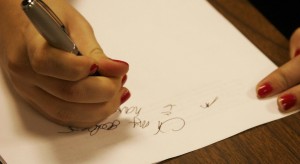We’ve all been there. Frantically typing away, desperately trying to finish that term paper draft the night before it’s due. The pressure, the panic, the finger cramps. What if that feeling never went away? Welcome to National Novel Writing Month (NaNoWriMo).
NaNoWriMo is an annual creative writing challenge that started on Nov. 1 and encourages all participants to write a 50,000-word novel by midnight on Nov. 31. NaNoWriMo began in 1999 and has evolved into a national phenomenon. In 2011, a grand total of 256,618 people registered on its official website. More than 14 percent of them won the contest when they met the word count, had their names added to the Winner’s Page and received a winner’s certificate.
One certainly needs more intrinsic motivation than just material reward in order to launch such an ambitious project, though.
“I have planned this book, or at least its characters, for 10-14 years,” freshman Divya Persaud said. “I took advantage of NaNo[WriMo] to push myself to finally begin the story.”
There are also some first-time writers who are participating, like freshman Christian Freitas, who was inspired simply by the idea of the contest.
“I usually like writing, but this sort of challenge will be a good way to push my boundaries,” she said.
One of those boundaries, discipline, is itself an acquired skill. By Nov. 3, only three days into the month, freshman Gina Fabio has already conjured up 12,000 words, way ahead of the suggested 1,667 words per day quota.
“I’ve found two good tricks for boosting word count,” she explained. “Expand all your contractions and kill off a major character.”
This is Fabio’s fifth year doing NaNoWriMo; she has completed the project twice previously. Luckily, the college workload has not taken its toll on her writing.
Things have not been so smooth for freshman Amy Entin.
“I have the plot thoroughly planned out, but I haven’t slept in two days because of school,” she said. “I’m not doing so hot on word count, but I’m hoping to play some catch-up tomorrow.”
There’s no need to panic, though. It seems that NaNo-WriMo can be manageable, even in college. Sophomore Katherine Varga learned some lessons in time management from her experience with the contest last year.
“What I did was stay up later and wake up half an hour earlier to write,” she explained. “I was taking classes at [the Eastman School of Music], so I wrote on the bus ride a lot.”
Last year, Varga finished her novel seven minutes before midnight deadline in Starbucks. The great rush and sense of accomplishment was “stronger than a quadruple-shot espresso,” she remembers.
“It was the most fantastic feeling ever,” she said.
Funny she should mention Starbucks. Caffeine, along with snacks and avoiding the Internet, is very high up on UR participants’ lists of strategies.
Freshman Emily Chambers recommends “Writers App,” an app that organizes a novel in progress into neat sections of synopsis, premise, plot, chapters and more. It can also set a time limit; if a certain word count is not met by the end of a writing session, penalty ensues.
Persaud has a different kind of game plan.
“I think my only strategy is to keep snacks close and my door shut,” she said.
Others leave their doors wide open. Chambers noted that there is a “dares section” on the NaNoWriMo online forum, where people encourage each other to use certain words or phrases in their novels.
Varga was also open to some outside ideas.
“I told my suitemates to say random things so I could put them into my novel,” she said.
In fact, her suitemate’s Cosmopolitan Magazine inspired the first line of her novel which reads: “The first time I saw my freshman year college roommate, I looked him up and down and said, ‘So, why are your clothes still on?’”
Don’t let the bawdiness fool you; what Varga has in mind is a “great American novel archetype” that, in its 20-year time span, “explores the idea of literature and time.”
While Varga may be shooting for the stars, most UR participants seem to have humbler ambitions.
“Plot-wise, I know what happens next, and I know vaguely how it ends, but I like to figure it out as I go along,” Fabio said of her novel.
Iyer, on the other hand, said she is “basically trying to get as many mindfucks into my novel as possible.”
“When [plot twists] aren’t coming, I’ll shove in a lot of imagery and fanciful ‘adjective orgies,’” she said. “I have no shame. It’s NaNoWriMo.”
It is indeed NaNoWriMo — a month of unapologetic creativity and frolic insanity. Buckle up, writers, and unleash your inner books.
Zheng is a member of
the class of 2016.

